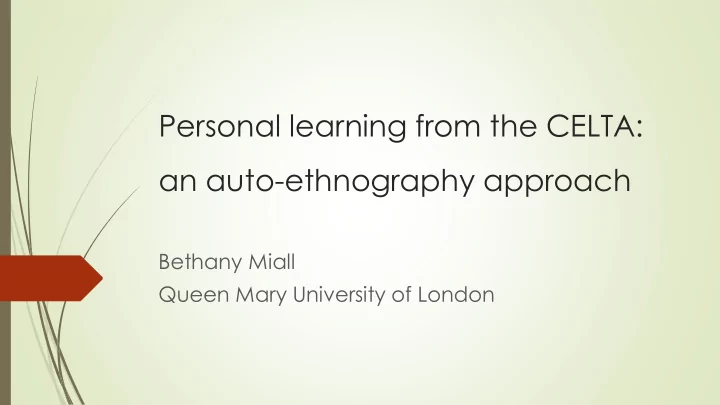

Personal learning from the CELTA: an auto-ethnography approach Bethany Miall Queen Mary University of London
Talk Structure auto-ethnography my reflections on the CELTA implications of my research Q&A
What is auto-ethnography? Utilises autobiographical and ethnographical approaches by linking the researcher’s experiences with those of the culture/group they are studying Impartiality is abandoned; the researcher’s reflections are the basis of research ‘auto -ethnography is one of the approaches that acknowledges and accommodates subjectivity, emotionality, and the researcher's influence on research’ (Ellis et al., 2010, p.3)
Methodological tools of auto-ethnography 1. Thick description (Geertz, 1973); interpreting rather than simply observing 2. Reflection (Dewey, 1910); question everything, take nothing for granted 3. Linking the above to relevant literature ‘weave of story and theory ’ (Spry, 2001, p.713)
Auto-ethnography and the CELTA Certificate in Teaching English to Speakers of Other Languages I kept a daily journal throughout my CELTA training I used thick description and reflection to record my experiences Further reflection through weekly e-mail discussion with dissertation supervisor Initially focused on various topics but focus narrowed to teaching approaches and ideology only Content analysis of journal generated data for discussion
Journal Extract Example We had an input session about the communicative approach; the attitude of trainer one seemed to be that a communicative approach with reduced teacher authority is the best approach, regardless of the context. He/she acknowledged that some cultures prefer teacher authority but said learners are likely to prefer communicative teaching; I feel this is a little simplistic and imposes a Western way of thinking onto other cultures.
Auto-ethnography and the CELTA Certificate in Teaching English to Speakers of Other Languages I kept a daily journal throughout my CELTA training I used thick description and reflection to record my experiences Further reflection through weekly e-mail discussion with dissertation supervisor Initially focused on various topics but focus narrowed to teaching approaches and ideology only Content analysis of journal generated data for discussion
Auto-ethnography and the CELTA I was both sole participant and researcher My daily journal was my data The discussion linking my experiences to literature constituted the findings of the research
Findings: my reflections on the CELTA The CELTA prioritises teaching approach over learner needs Trainees not shown how to adapt teaching methods or respond to learner needs ‘Outdated’ techniques: L1 avoidance Pronunciation drilling Assumption that communicative approaches work everywhere
Journal Extract – reflecting on L1 use I also witnessed how effective translation can be whilst observing a trainee’s teaching practice; some learners had not fully understood a new vocabulary item and the trainee had been unable to clarify it for them. After the end of the lesson, a trainee who shared these learners’ L1 provided the translation for them and they immediately understood.
Findings: my reflections on the CELTA The CELTA prioritises teaching approach over learner needs Trainees not shown how to adapt teaching methods or respond to learner needs ‘Outdated’ techniques: L1 avoidance Pronunciation drilling Assumption that communicative approaches work everywhere
Research Implications 1. Trainees need to be made better aware of differing contexts and learners they’re likely to encounter Could be achieved through input sessions outlining educational beliefs and practices around the world 2. Show trainees how to be selective with teaching methods Could be achieved through advice on how methods can be adapted, perhaps drawn from trainers’ own teaching experiences 3. Freshening up of CELTA syllabus in regards to L1 use
Conclusions Auto-ethnography allows us to reflect on our own experiences in a structured way After reflecting on my experiences I concluded that the CELTA prioritises teaching approach over learner needs, and some of its teaching techniques could be considered outdated Changes could be made to better prepare trainees for varied teaching contexts, and help given to choose methods appropriately Syllabus could better incorporate the L1
Thank you for listening Questions?
References Dewey, J. (1910). How We Think . Boston: D.C. Heath & Co. Ellis, C., Adams, T., & Bochner, A. (2010). Autoethnography: An overview. Forum: Qualitative Social Research, 12 (1). Retrieved from http://www.qualitative-research.net/index.php/fqs/article/view/1589/3095 Geertz, C. (1973). Thick description: toward an interpretive theory of culture. In C. Geertz (Ed.), The Interpretation of Cultures (pp. 3-30). New York: Basic Books. Short, N., Turner, L., & Grant, A. (2013). Contemporary British Autoethnography . Rotterdam: Sense Publishers. Spry, T. (2001). Performing Autoethnography: An Embodied Methodological Praxis. Qualitative Inquiry , 7 (6), 706- 732. If you’d like to read my dissertation in full, please e -mail me your request at bethany-g-c@hotmail.com
Recommend
More recommend